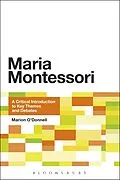Maria Montessori considers the origins of Montessori education, examines the key themes of this philosophy of education and explores the relevance of Montessori practices today. Montessori students aged 3-18 study in a stress-free environment with no timetables, no examinations and no homework and yet they are empowered, independent and self-disciplined learners. The curriculum follows the interests of individual children and Montessori educators focus on the development of the whole child, promoting happiness and wellbeing. Marion O'Donnell explores the key aspects of Montessori education: child development; the learning environment; the role of the teacher; the role of the learner and parental involvement. Within each key aspect, Marion considers the implications for Montessori education, the views of critics and supporters, the implications for education today and the implications for research. Each aspect is considered within an international context, drawing on research and practice in Europe, the USA, South America, Australia and Asia.
Autorentext
Marion O'Donnell is a Montessori World Educational Institute (Australia) Workshop Lecturer, Examiner and Tutor. She has worked as a teacher all over the world, including in the UK, Canada and Australia. She has also lectured at the Queensland University of Technology, Australia, and been a researcher at the University of Queensland, Australia.
Inhalt
Introduction
1. The Foundations of Montessori Education
2. Montessori and the First Children's House
3. Teacher Training and the Early Dissemination of Montessori Education
4. Montessori and Child Development
5. Montessori, the Teacher and the Prepared Environment
6. Montessori, Parents and the Home Environment
Conclusions
Bibliography
Definitions of Some Montessori Terms
Index
